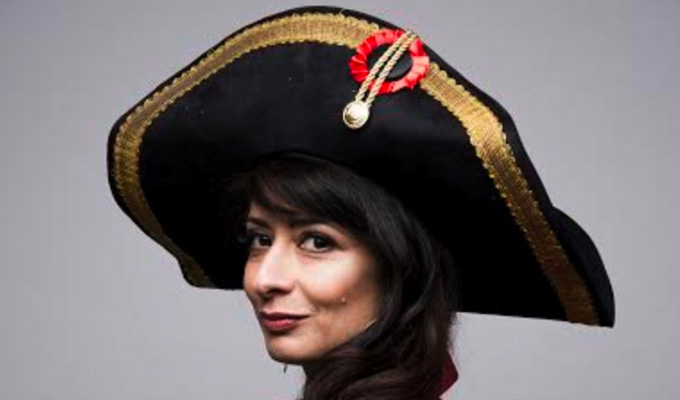
Shappi Khorsandi: Mistress and Misfit
Note: This review is from 2017
Edinburgh Fringe comedy review by Jay Richardson
Shappi Khorsandi devoted her last show to a celebration of Britishness. And one of Britain's great heroes, Admiral Horatio Lord Nelson, features prominently in this show. But it is his mistress, Emma Hamilton, whom the comic truly admires. And to an extent, identifies with.
The connections initially seem tenuous, with the comic imagining Hamilton, a celebrated beauty and celebrity in her day, being stopped for selfie-like sketches by an artist. Meanwhile, Khorsandi's own experiences of encountering the public for posed photographs have come as almost as big an ego blow to her as the pervert who's been leaving sexual letters for her backstage. About another female comedian.
Like Hamilton, Khorsandi also thought she'd die in Calais. But only of embarrassment after Jude Law failed to distinguish her from a refugee in the camps they were supposed to be helping.
Still, Hamilton was the muse of the painter George Romney and Khorsandi, a former life model, can relate, albeit less favourably, to being judged on your body rather than your mind. Born into poor circumstances, Hamilton was smart but lacked formal education and spent her life as the plaything of aristocratic men who treated her like a trophy to discard on a whim.
Khorsandi, meanwhile, nominated for a BAME award for debut novelists, withdraw herself from consideration, not wishing to let her literary talent be defined by the colour of her skin. As with her previous hour, she demands the right to define her own identity, indulging neither cuddly casual racists nor keyboard social warriors shaming her for supposedly abandoning her ethnic platform.
Most illustrative here is that familiar staple of the middle-aged stand-up set, the colonoscopy procedure, where Khorsandi finds it's her skin tone that's scrutinised more closely than her bowels. Treated with the utmost reverence by a nurse who's a fan of her famous poet father, she nevertheless discovers another massaging her records, skewing the ethnic truth for reasons that throws up some troubling questions.
One area in which Khorsandi departs from Hamilton is that as a successful artist, she's never been made to choose between her children and security, with Emma forced to give up her lovechild for adoption by her master Lord Greville.
Yet there but for the grace of God mutters the comic, as she reveals the rather 18th Century attitudes of her daughter's father, who blamed her for the pregnancy and was all for unburdening himself of it in the quickest means possible.
The real meat of the show arrives when Khorsandi explores Hamilton's early career as a prostitute, quoting the startling statistic that one third of the women in London would have passed through Covent Garden as sex workers at the time, picking up the Trip Advisor reviews of the day as they went.
As someone who frequently suffers the brickbats of cloddish reviewers – and slash fiction about other comics let's not forget – Khorsandi is entirely sympathetic. Although no reviews remain of Hamilton's time in a brothel, the comic quotes some staggeringly misogynist notices for other girls, their services and ethnicities rendered in hilariously arrogant, politically incorrect prose.
And then there's Khorsandi's own dabbles with sex for cash. Although nowhere near as strongly defined as the examples offered up by say, Sophie Willan or Desiree Burch at this festival, she recalls some youthful hi-jinks in Amsterdam, taking advantage of an American businessman's largesse with a tacit understanding that there were strings attached.
Once again she feels that she acted not so far from Hamilton's example, doing what she had to in order to survive, even if it had been brought about by her relative freedom to be adventurous. If Hamilton was the property of whichever man kept a roof over her head at the time, it's at least a pattern that Khorsandi can discern repeated as recently as the life of her Iranian grandmother.
Following a succession of complicated domestic arrangements, Hamilton ultimately found true love with Nelson. But it's here Khorsandi really finds the dark underbelly to her championing of Britain and its patriotic self-image, relating how the Admiral's wishes for his family to be looked after in the event of his death were ignored by the Establishment and Hamilton discarded as she so often had been before.
Presented in a lecture hall, Khorsandi keeps Hamilton's story from getting too scholarly with her diversions into self-aware, with trying-to-keep-down-with the kids bursts of grime as she recalls struggling to sustain a relationship with a younger man. And then there are those euphemisms for anal sex that she imparts in the prostitute reviews.
Still, she can't quite shake the impression that Hamilton's story holds a certain amount of interest for her, with some strong parallels and even the prompt for personal revelation. But it isn't really at the core of her being. As such, it would probably make an interesting Radio 4 programme but it isn't quite her most potent stand-up.
Review date: 25 Aug 2017
Reviewed by: Jay Richardson









